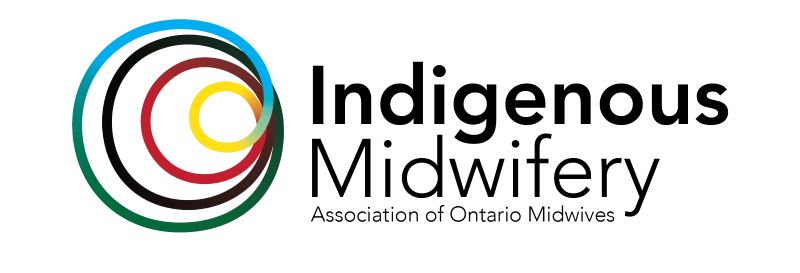Indigenous Midwifery

A new logo for the Indigenous Midwifery (IM) team at the AOM has been designed to serve as a beacon guiding First Nation, Inuit and Metis rights holders to relevant information and opportunities, including Indigenous Midwifery Program (IMP) funding.
An evolution of the AOM logo, the IM logo comprises four interconnected circles on a white background. The number four is culturally significant, present in the life teachings of many nations across Turtle Island. The four colours of the Medicine Wheel - yellow, red, black and white - are representative of the four directions, four medicines, four colours of people and much more. The inner yellow circle represents the new life at the centre; the red circle represents family; the black represents community; and white, the nation. The green of the outer circle symbolizes connection to the Earth and her medicines that help and heal in pregnancy, birth and beyond; blue evokes the water that carries new life for nine months and sustains life beyond the womb.
Across Ontario, 60 Indigenous midwives are engaged in the profound work of returning birth to Indigenous communities. Some are working as registered midwives, others practice as community governed Indigenous Midwives working under the Exemption (Aboriginal midwives). All of these passionate and committed midwives are transforming maternal and child health by providing culturally appropriate care to Indigenous families and communities and re-awakening Indigenous cultural knowledge and practices.
Click the link below for the location of Indigenous Midwifery programs in Ontario.
Find an Indigenous MIDWIFE
When it comes to providing primary care for new parents and babies on their territories, Indigenous Midwives working under the Exemption (Aboriginal) face unique challenges. While the province’s Midwifery Act acknowledges their right to practice autonomously in their communities, it is only recently that these midwives have been able to access the same funding streams as registered midwives. Alongside the National Council of Indigenous Midwives (NCIM), the AOM continues to advocate for changes to the health-care system that will eliminate barriers to practice and ensure that more Indigenous babies are born on their own land, with their births attended by Indigenous midwives.
This advocacy work has resulted in the Ministry of Health supporting Indigenous midwifery and culturally appropriate care by providing funding for Indigenous Midwifery Programs in the following communities:
- Dilico Family Health Team Clinic in Fort William First Nation – Dilico Family Health Team
- K’Tigaaning Midwives in Nipissing First Nation - K'Tigaaning Midwives
- Kenhté:ke Midwives in Tyendinaga Mohawk Territory - Kenhté:ke Midwives
- Onkwehon:we Midwives Collective within the Mohawk Nation at Akwesasne – Onkwehone:we Midwives Collective
- Shkagamik-Kwe Aboriginal Health Access Centre in Sudbury - Shkagamik-Kwe Health Centre
- Southwest Ontario Aboriginal Health Access Centre in London – SOAHAC
- North Channel Indigenous Midwifery – Elliot Lake / North Shore North Channel Indigenous Midwifery
- Seventh Generation Midwives in Toronto – Seventh Generation Midwives
Indigenous (Exemption) midwives working have been providing services at Six Nations Maternal and Child Centre since 1996 and are funded through the Aboriginal Healing and Wellness Strategy. Access information about available services here:
- Six Nations Maternal & Child Centre in Ohsweken - Tsi Non:we Ionnakeratstha Ona:grahstá 'The Place They Will Be Born'
Neepeeshowan Midwives has been operational since 2012 in the Cree community of Attawapiskat on the James Bay coast. Find out more about their services here:
- Neepeeshowan Midwives in Attawapiskat First Nation - Neepeeshowan Midwives
